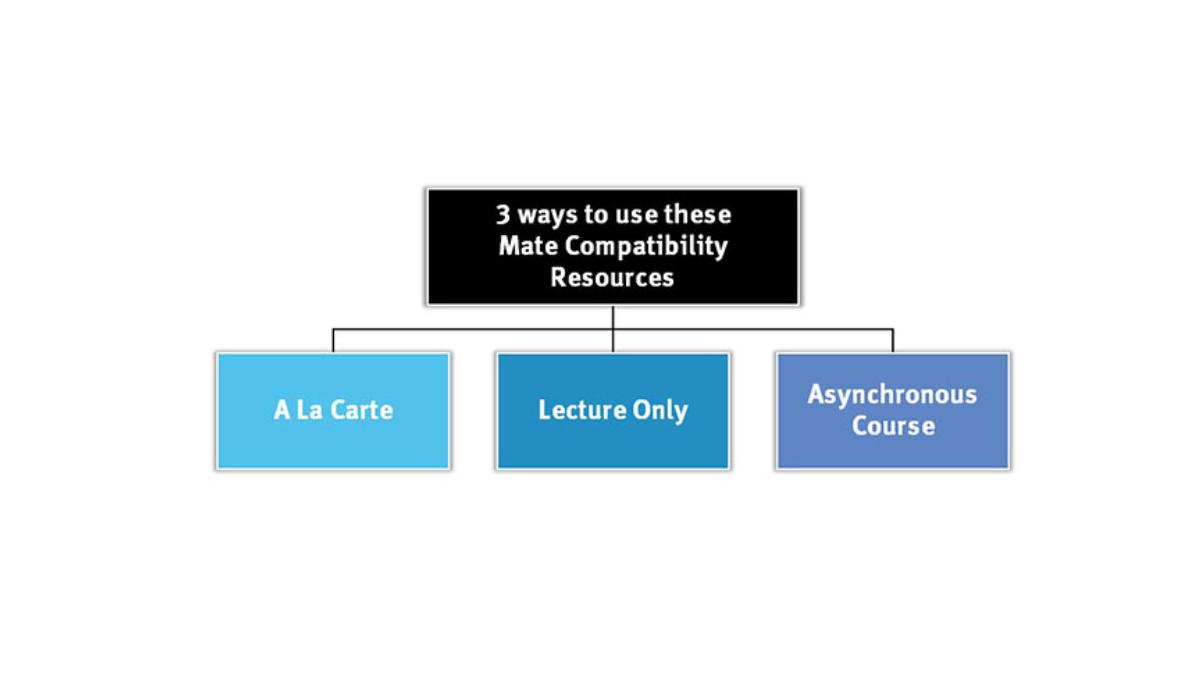
Increasing Mate Compatibility for Improving Population Sustainability

INTRODUCTION
Meghan Martin, Ph.D.
Director, PDXWildlife
The following materials were provided in June 2021 as part of a five-week virtual workshop sponsored by the AZA Reproductive Management Center (RMC) in coordination with the Behavior SAG.
The goal of this workshop was to increase our understanding of the factors influencing mate compatibility, a key component of successful reproduction. It provided the AZA staff members who manage breeding programs with a knowledge base for offering mate compatibility within their program(s) in order to improve the reproductive success of the population and/or specific individuals.
The organizers gave an overview of mate compatibility challenges, and guest speakers discussed factors that influence compatibility in a variety of species. After identifying priority species and issues, participants were divided into working groups and were provided examples of techniques for assessing and monitoring aspects of behavioral compatibility. Participants developed a research ethogram and protocol to measure mate choice and compatibility within their institution.
The workshop focused on practical methods for offering mate choice — methods which were beneficial for developing approaches that addressed these issues in the prioritized species discussed. The aim was to develop tools for promoting compatibility that could increase reproductive success, the basis for sustainable populations.
Presentations and supporting materials were provided digitally to all participants.
How to use the resources
The RMC is now offering these materials to anyone who would like a better foundation on topics related to mate compatibility. In particular, we think that these materials will be helpful for SSP coordinators and conservation breeding managers.
We envision these materials being used in the following three possible ways:

A La Carte Format
- Low time commitment
- Watch what you need, when you need it
- Fills gaps in current knowledge
Lecture Only Format
- Medium time commitment
- Watch all lectures in the order they are presented
- Provides a good overview of mate compatibility issues; presents research options if a related study is needed in the future
Asynchronous Course Format
- Large time commitment (3-4 hrs/week for at least 5 weeks)
- All materials provided are utilized in the order they are presented (i.e., Week 1 – Week 5). Within each week’s folder the expectations for the week are presented, along with the necessary presentations and/or readings and exercises to complete each week.
- Individuals with particular mate compatibility issues learn how to design a research project addressing their concerns. The research project can carried out upon completion of this course.
- As such, individuals interested in using these materials in an asynchronous course format should plan to have at least one mate compatibility issue in mind and be prepared to devote about 3-4 hrs/week for 5 weeks to create a research design. Work for this course will be completed independently.
Note: The forms and exercises are to aid in identifying and troubleshooting any mate compatibility issues you might be experiencing at your institution. All PDFs are downloadable for completion when time allows. If you prefer to complete PDFs on the computer, most can be completed online and then saved for future reference. If upon completion of the forms and exercises, you would like further assistance with your mate compatibility issue, please feel free to reach out to Meghan Martin for further advice. Her contact information is provided below.
RMC Mate Compatibility Workshop
Instructors and Contributors
The following is the list of the individuals who were involved in the creation of this course when it took place virtually in 2021, along with a list of individuals who provided recorded lectures.
Organizers
- Meghan Martin, Ph.D. – Director, PDXWildlife
- Cheryl Asa, Ph.D. – Advisory Board Chair, AZA Reproductive Management Center
- David Powell, Ph.D. – Director of Research, AZA Reproductive Management Center
- Monica McDonald, Ph.D. – Program Scientist, AZA Reproductive Management Center
Presenters
- Meghan Martin, Ph.D. – Director, PDXWildlife
- Cheryl Asa, Ph.D. – Advisory Board Chair, AZA Reproductive Management Center
- Mike Lubbock – Executive Director, Sylvan Heights Bird Park
- Paul Senner – Population Biologist, AZA Population Management Center
- Annie Newell-Fugate, Ph.D. – Professor, Texas A&M.
- Jeff Sailer – CEO/Executive Director, Toledo Zoo
- Alison Greggor – Researcher, San Diego Zoo Wildlife Alliance
Contact Us:
Feel free to contact us if you have any questions about these materials or would like additional guidance on a particular mate compatibility issue.
Monica McDonald – mmcdonald@stlzoo.org
Meghan Martin - meg@pdxwildlife.com






